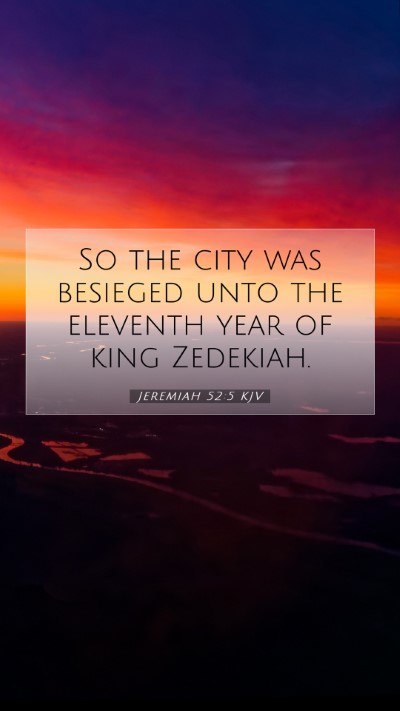Understanding Jeremiah 52:5
Jeremiah 52:5 states, "So the city was besieged unto the eleventh year of king Zedekiah." This verse marks a significant historical moment in the biblical narrative, providing insight into the downfall of Jerusalem and the circumstances leading to the Exile of the Jewish people.
Bible Verse Commentary
The commentary on this verse offers a rich understanding of the events surrounding the fall of Jerusalem. Notably:
- Historical Context: This verse situates the reader in a critical historical context, namely the Babylonian siege which led to the destruction of Jerusalem in 586 B.C.
- Tension and Judgment: The siege emphasizes God's judgment upon His people due to their ongoing disobedience and failure to heed the prophetic warnings issued by Jeremiah and other prophets.
- Spiritual Impact: The siege represents not just a military conquest but also a spiritual failure, where the people of Judah turned away from their covenant commitments to God.
Insights from Commentaries
Several prominent public domain commentaries offer deep insights into Jeremiah 52:5:
- Matthew Henry: Henry emphasizes the relentless nature of the siege as a symbolism of divine judgment. He notes that the prolonged siege serves as a cautionary tale about the consequences of sin and unfaithfulness to God.
- Albert Barnes: Barnes focuses on the timeline of the siege, interpreting it as a demonstration of God’s patience and the eventual culmination of His plan of justice. He remarks on Zedekiah’s failure as king, stating that it is a direct result of the nation's rebellion against God.
- Adam Clarke: Clarke dives into the implications of the siege, highlighting its significance in the broader narrative of exile and restoration. He interprets this event as both tragic and as a necessary step toward redemption and the future return of the exiles to their homeland.
Significance of Jeremiah 52:5
This verse is significant not just in its immediate context but in its lasting implications for biblical theology and understanding of God’s dealings with His people:
- Prophetic Fulfillment: It fulfills the prophecies of pending judgment spoken by Jeremiah, underscoring the importance of prophetic voices in guiding the faithful.
- Exile as a Theme: The siege marks the beginning of the Exile, a major theme in the Old Testament that represents separation from God and the community; yet, it also sets the stage for future hope and restoration.
- Call to Repentance: The events chronicled in this verse speak to the timeless call for individuals and nations to repent and return to covenant obedience.
Cross References
Related passages that enhance the understanding of Jeremiah 52:5 include:
- 2 Kings 25:1-7: This account provides details on the siege's outcome, including the destruction of the temple.
- Lamentations 1:1-3: Reflects on the sorrow of Jerusalem during the siege, personifying the city as a widow in distress.
- Isaiah 39:6-7: Foretells the coming exile as a result of king Hezekiah's pride, showing the continuity of God’s warnings.
Application and Reflection
For those engaged in Bible study groups or online Bible study, examining Jeremiah 52:5 can lead to profound discussions about:
- The nature of God’s judgment: Understanding the balance between God’s justice and mercy.
- The importance of faithfulness: Reflecting on personal and communal faithfulness to God's commands.
- Lessons from history: Learning about the consequences of societal moral decay and the importance of repentance.
Conclusion
Jeremiah 52:5 serves as a crucial verse in understanding the context of Jerusalem’s fall and its theological implications. Through various commentaries and cross-references, one can gain a deeper Bible verse understanding and reflect on the enduring lessons found within Scripture.


